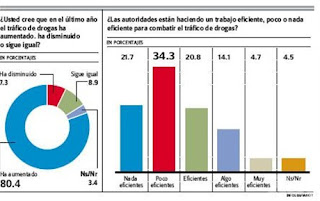Economic growth: a true success?
In the next 10 years we shall assist to rise of Chile as first developed country in Latin America. In fact, we could certify it by recognizing its membership to OECD and its high quality life level -compared to the other countries in the region- that even Brazil, the biggest south-american GDP, will not get soon. Anyway, we are in front of an unprecedented expansion of Latin America's economies, largely due to high flows of foreign capital that has found in the region an interesting group of large and growing markets.
It's not a big lie that Latin America GDP is growing faster than U. S. and Europe economies and seeming to be more dynamic like the Asian countries, except Japan. That's why so many economists around the World are calling XXIst century as "Latin America's moment", as XIXth was the Old European empires century (France, England, Germany) and XXth century was the greatest moment for political, economic and cultural hegemony of America.
For an unaware observer, the great crisis in 2008 was the critical point in the most important economies and was the reason that marked the end of an unipolar world. But I could think the only consequence of the crisis have been to accelerate the emergence of developing economies and the prostration of the more advanced nations. It was going to happen anyway. So, what's the difference between United States and Europe prosperous centuries and Latin America's one?, in fact, it's not an easy issue. In XIXth and XXth centuries, US and the West european countries developed a kind of State of Welfare (one of the strongest reasons to understand the immigration phenomena), in the one hand, and in the other, in America, an efficient market system without regulation that sustained private enterprise and it made U. S. the world's greatest power.
In XXIst century we cannot establish an homogeneous behavior in South american countries. No country enjoys a welfare state, but all have high fiscal deficit, no country has a totally centralized economy system, but in Venezuela and Bolivia the private company has no guarantees; most countries have liberalized their domestic markets, but are poorly connected to international trade, including Colombia. No country in Latin America has an efficient market system and a State capable of providing adequate welfare standards. Yes, Latin America is a paradise for investment, but not for workers and unemployed. I think the only exception is Chile.
But we must go further. If Europe and U. S. are currently arriving to a kind of knowledge society, as shows the existence of major universities, businesses in the area of innovation and the most prestigious research centres, Latin America is, in the best of worlds, leaving behind an agricultural society, low-tech and very poorly qualified. This century could be a new age for emerging countries in America, but its still weak democracies, high levels of poverty and low coverage and low quality of Health and education services are suggesting that this success must not be celebrated: it's just the beginning, we are in a club of rich-poor- countries.



Comentarios